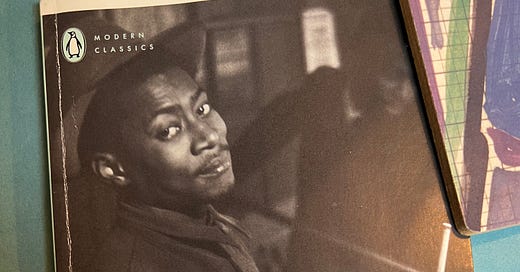Sam Selvon’s The Lonely Londoners.
I hadn’t till recently read Selvon’s famous novel about the 1950s West Indian immigrant experience – though for some reason had read one of its two sequels, Moses Ascending (1975), which, despite a strain of sexism that’s pretty hard to take, is laugh-out-loud funny, and ingeniously inverts and parodies several colonial tropes: landlord/tenant, upstairs/downstairs, Robinson Crusoe/Friday.
What struck me most about The Lonely Londoners, on a first reading anyway, was its innocence and optimism, moods which seemed so pervasive that once or twice I wondered if the title is a trick.
It isn’t. The novel begins on a ‘grim winter evening’ in the fog, like Dickens’s Bleak House. Moses is sadder, more pessimistic, less certain than he is in Moses Ascending: ‘This is a lonely miserable city, if it was that we didn’t get together now and then to talk about things back home, we would suffer like hell’. Waterloo Station, where he meets Galahad, an arrival from Trinidad (and a terrific character), is a gateway to poverty, unemployment and (hideously genteel) racism.
Yet the novel is superb on how London ‘divide up in little worlds, and you stay in the world you belong to and you don’t know anything about what happening in the other ones except what you read in the papers’ – and Moses and Galahad’s London, with its weird sun (‘like a force-ripe orange’) and its incongruous seagulls (‘he always think that seagulls belong to the sea’), pulses with joy and pleasure. For Galahad, it remains the promised land: ‘Always from the first time he went there to see Eros and the lights, that circus have a magnet for him, that circus represent life, that circus is the beginning and the ending of the world’. The remarkable prose poem in the novel’s middle certainly has its stings – but time and again Selvon’s nation language blooms into an unapologetic celebration of the London summer, which – I think? – is rare for 1950s London novels.
Partly this is the characters romanticising their new home; partly it’s their homesickness for the islands. It’s also their ‘ballad’ to community, and to the gorgeous promise of tomorrow – and it’s exhilarating to read:
oh it does really be beautiful then to hear the birds whistling and see the green leaves come back on the trees and in the night the world turn upside down and everybody hustling that is life that is London oh lord Galahad say when the sweetness of summer get in him he say he would never leave the old Brit’n as long as he live




